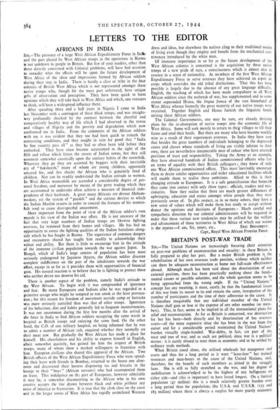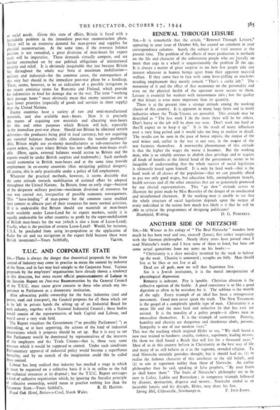BRITAIN'S POST-WAR TRADE
Sta,—The United Nations are increasingly focusing 'their attention on post-war problems of reconstruction and security: in these Britain is fully prepared to play her part. But a major British problem is, the rehabilitation of her own overseas trade position, without which neither can there be adequate reconstruction at home nor full-scale effectiveness abroad. Although much has been said about the deterioration of our external position, there has been practically nothing about the funda- mental causes or possible solutions, and the whole question seems to be being approached from the wrong angle. If the "United Nations" concept has any meaning, it must, surely, be that the fundamental issues of this war from its outset to its end remain the same, irrespective of the number of participants and the time of their adherence to the cause. It is therefore inequitable that any individual member of 'the United Nations shall gain or lose at the expense of any other member (or mem- bers). This, in fact, seems to be implied in all the international plans for
185 million) where there is always a surplus for more purely economic
relief and reconstruction. As far as Britain is concerned, war destruction for her has been—both directly and by deterioration of her overseas assets—all the more expensive since she has been in the war from the outset and for a considerable period ir.aintained the United Nations' burden virtually single-handed. War-debts, in fact, are part of the wear and tear of war, and as such are political, since war is a political matter: it is surely absurd to treat them as economic and to be settled by ordinary trade methods.
When Britain stood alone, she utilised wholesale her manpower and assets and thus for a long period as it were "lease-lent" her trained resources and man-hours to the cause of the United Nations, and, therefore, for the benefit of such members as. joined in the struggle later. She is still as fully stretched as she was, and her degree of mobilisation is acknowledged to be the highest of any belligerent on either side—and (this is important) to have lasted longest. On a limited population (47 million) this is a much relatively greater burden over a long period than for populations like U.S.A. and U.S.S.R. (135 and or social seeds. Given this state of affairs, Britain is faced with a formidable problem in the immediate post-war reconstruction phase. There will be an extensive demand for man-pcwer and supplies for physical reconstruction. At the same time, if the overseas balance position is not remedied, a great diversion of man-hours for export trade will be imperative. These demands virtually compete, and are further encroached on by our political obligations of international security and relief. It is obviously inequitable that just because Britain has throughout the whole war been at maximum mobilisation— military and industrial—for the common cause, the consequences of this very fact should in the immediate post-war phase be a handicap. There, seems, however, to be an indication of a possible instigation in the recent armistice terms for Rumania and Finland, which provide for indemnities in kind for damage due to the war. The term "working their passage home" must obviously mean that enemy countries are to have lower priorities (especially of goods and services in short supply) than the United Nations.
Enemy countries have a variety of raw and semi-manufactured materials, and also available man - hours. Now it is precisely the means of acquiring raw materials and allocating man-hours for this and other purposes which Britain will lack, especially in the immediate post-war phase. Should not Britain be allocated certain deliveries—the producers being paid in local currency, but nor acquiring any external balances thereby (this eliminates the transfer problem)? Also, Britain might use ex-enemy manufacturers as sub-contractors for export orders, in cases where Britain has not sufficient man-hours avail- able. (Here, again, external balances would accrue to Britain and the exports would be under British auspices and trademarks.) Such methods would economise in British man-hours and at the same time provide employment in ex-enemy countries (thus mitigating political dangers). Of course, this is only practicable under a policy of full employment.
Whatever the practical methods, however, it seems desirable that the same attitude towards mobilisation of national effort be adopted throughout the United Nations. In Britain, from an early stage—because of the desperate military position—maximum diversion of resources for war was carried out, irrespective of possible economic consequences. This " lease-lending " of man-power for the common cause enabled later corners to allocate part of their resources for more normal activities. If it is undesirable that Britain should use materials or man-hours made available under Lease-Lend for its export markets, surely it is equally undesirable for other countries to profit by the super-mobilisation of British man-hours for the war (which is also a form of Lease-Lend). Finally, what is the position of reverse Lease-Lend? Would, for instance, U.S.A. be precluded from using jet-propulsion or the application of Radar for air and sea navigation in the export field because these were British inventions?—Yours faithfully, VIATOR.



























 Previous page
Previous page